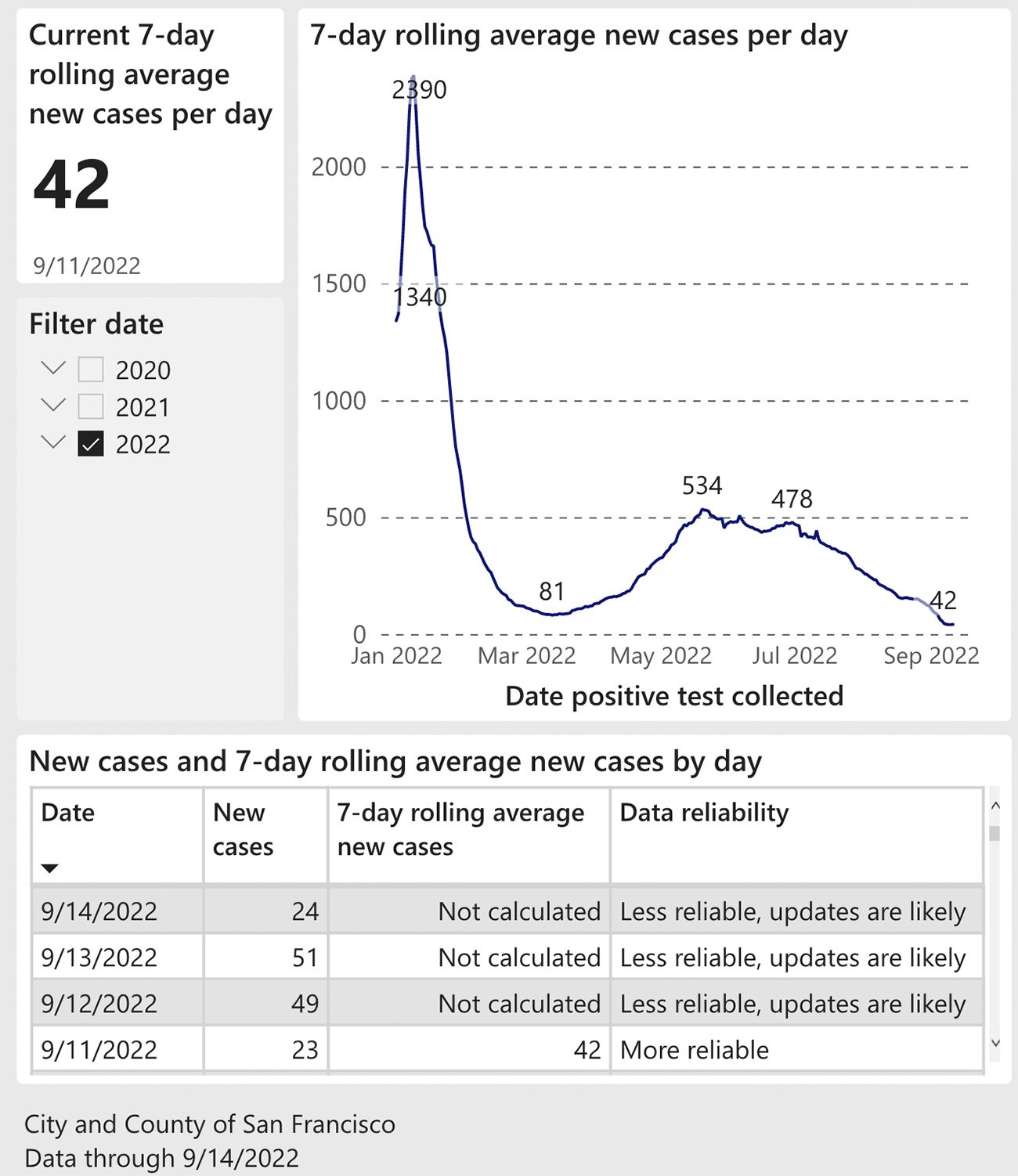Barring further, unforeseen variants and upticks, COVID-19 may finally be relegated to still-sometimes-deadly seasonal nuisance — now that President Biden proclaimed on 60 Minutes that "the pandemic is over," and now that our own UCSF COVID soothsayer Dr. Bob Wachter is ready to go back to indoor dining.
San Francisco's daily count of new COVID cases has been shrinking in the last several weeks, and was down to just 24 as of Monday — with the seven-day average now down to 38 cases per day. That's a significant decline from early August, when the official count was averaging 250 to 260 cases per day — and experts have warned that the real count is likely 5 to 10 times the official count, due to the prevalence of at-home testing.
The Bay Area's seven-day average has also been sliding, though not quite as precipitously as SF's.


Dr. Wachter took to Twitter on Sunday, as he has many times in the past two and a half years, to announce where he is at in terms of COVID caution, saying that he's now ready to dine indoors and remove his mask in most situations.
"Up until now, I’ve avoided indoor dining and worn a mask in all crowded indoor spaces," Wachter said. "I’m now ready to eat indoors & (selectively) remove the mask."
This comes just three weeks after Wachter made a point of saying that case counts were not yet low enough for him to feel comfortable dining indoors again. At the time, in late August, San Francisco was seeing well over 100 new cases per day by the official count, or about 19 cases per 100,000 residents, and Wachter estimated that there was still a five- to ten-percent chance of becoming infected with the BA.5 variant from "moderate" exposure to an infected person in an indoor setting.
Dr. Wachter predicted that the numbers would slide within a few weeks, and they have. He had said his threshold for going back inside restaurants would be fewer than 5 new cases per day per 100,000 residents.
Wachter also cited the fact that UCSF's rate of asymptomatic test positivity at its hospitals was down to 1.6% from around 5% in August.
He goes through an involved risk calculation based on the odds of encountering an infected person in a restaurant, the odds of actually catching the virus, and the fact that he received his updated booster for the Omicron variants which he estimates will cut his risk of infection in half. And he concludes that leaves him with a 1-in-200 chance of getting BA.5 in a restaurant setting — and he estimates his chance of dying from that maskless dinner, given the odds of severe infection and the effectiveness of Paxlovid, would be around 1 in 200,000.
... which would ultimately place my estimated chances of dying from my indoor maskless dinner at 1-in-200,000. This is consistent with other risks we all take to do some things we enjoy. https://t.co/d90TZFiEA8 (17/25)
— Bob Wachter (@Bob_Wachter) September 18, 2022
"I’m far more worried about Long Covid," Wachter writes, noting that given the available data, the chances of getting Long COVID at a maskless dinner would be about 1 in 2,000. Wachter's wife was exhibiting signs of Long COVID several months ago after she was infected and then had a relapse following a course of Paxlovid.
"If you’ve been in careful mode, as I’ve been, are these risks now low enough to enjoy indoor dining in SF? To me, they are," Wachter writes. But, he adds, "Are they low enough to ditch the mask in a crowded & poorly ventilated indoor space or on an airplane? For me, the answer's still no."
Wachter says that he expects to wear a mask on airplanes for the rest of his days.
President Biden, speaking last week with 60 Minutes, declared in what aides are now saying was an off-the-cuff remark, "The pandemic is over."
"We still have a problem with COVID," Biden said. "We’re still doing a lotta work on it. It’s– but the pandemic is over. If you notice, no one’s wearing masks. Everybody seems to be in pretty good shape. And so I think it’s changing. And I think this is a perfect example of it."
The news media has been quick to note that the U.S. is still averaging around 400 deaths from COVID each day, which is higher than it should be for the endemic era of the virus. However, optimistically speaking, maybe that figure is still a hangover from summer surges around the country, and will continue to go down in the next few weeks.
Related: UCSF's Dr. Wachter on COVID Watch After Wife Tests Positive While Traveling

